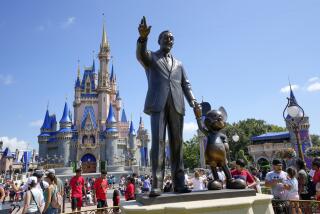Disney’s Mitchell to Delay His Exit
- Share via
Walt Disney Co. Chairman George J. Mitchell has agreed to stay on through next year at the request of the company’s directors -- a move that probably won’t please his critics.
Mitchell was asked to delay his retirement to smooth the process for picking his successor. He had planned to leave after the annual meeting early next year.
“With two new directors joining in January, the full board of 13 members will now have an appropriate amount of time to work closely together and carefully deliberate in the selection of Disney’s next chairman,” the Burbank-based entertainment company said.
The move, announced in a news release Friday, is at odds with Mitchell’s past public support of Disney governance rules requiring directors to retire when they reach 72, his current age.
When Roy E. Disney quit as a director in 2003 after learning that he would not be nominated for another term, it was Mitchell who publicly defended the board’s move as simply enforcing Disney’s rules.
Disney spokesman David Caouette said the board had the flexibility to waive the policy requiring mandatory retirement at age 72 and chose to do that in Mitchell’s case. Mitchell turns 73 in August.
Mitchell, a former U.S. Senate majority leader, was elevated from presiding director to chairman in March 2004. The position pays him $500,000 annually in stock.
His appointment came as Disney’s board stripped then-Chief Executive Michael Eisner of the title after a 45% no-confidence vote at the company’s annual shareholders meeting. Robert Iger, formerly Disney’s president, succeeded Eisner as chief executive Oct. 1.
Mitchell drew fire from investors for being too closely allied with Eisner, and from corporate governance experts for taking hefty consulting fees from companies on whose boards he served, including Disney.
Patrick S. McGurn, executive vice president of Institutional Shareholder Services, said the Mitchell extension should be “fairly palatable” to investors because it set a timetable for an orderly transition.
“It gives shareholders a basis for evaluating the process going forward,” McGurn said.
But Gregory P. Taxin, chief executive of the proxy firm Glass Lewis, said Mitchell should step down as planned.
“We don’t believe he has been effective, we don’t think he is independent, and we think he should go,” Taxin said
Disney also announced Friday that it had named two new independent directors and had increased its dividend.
The two new directors are John E. Pepper, 67, retired chairman and chief executive of consumer products giant Procter & Gamble; and Orin C. Smith, 63, who retired this year as president and CEO of the Starbucks Corp. coffee chain.
“Disney shareholders will benefit from their decades of world-class leadership, finance and high-profile consumer brand experience,” Mitchell said in a statement.
McGurn and Taxin both lauded Disney for increasing the number of independent directors. Eleven of 13 board members are now independent, a far cry from the days when the board included Eisner’s personal lawyer, architect and the principal of a school his children once attended.
Taxin, however, noted that Pepper was on the Xerox Corp. board of directors when the company improperly recorded $6.4 billion of revenue.
The restated financials reduced Xerox’s revenue by $1.9 billion from 1997 to 2001 and led to a $10-million fine to settle Securities and Exchange Commission fraud charges. Pepper was on the audit committee that failed to catch the costly accounting problems, Taxin said.
The Disney board has declared an annual cash dividend of 27 cents, a 12.5% increase from last year, the company said.
More to Read
The biggest entertainment stories
Get our big stories about Hollywood, film, television, music, arts, culture and more right in your inbox as soon as they publish.
You may occasionally receive promotional content from the Los Angeles Times.











